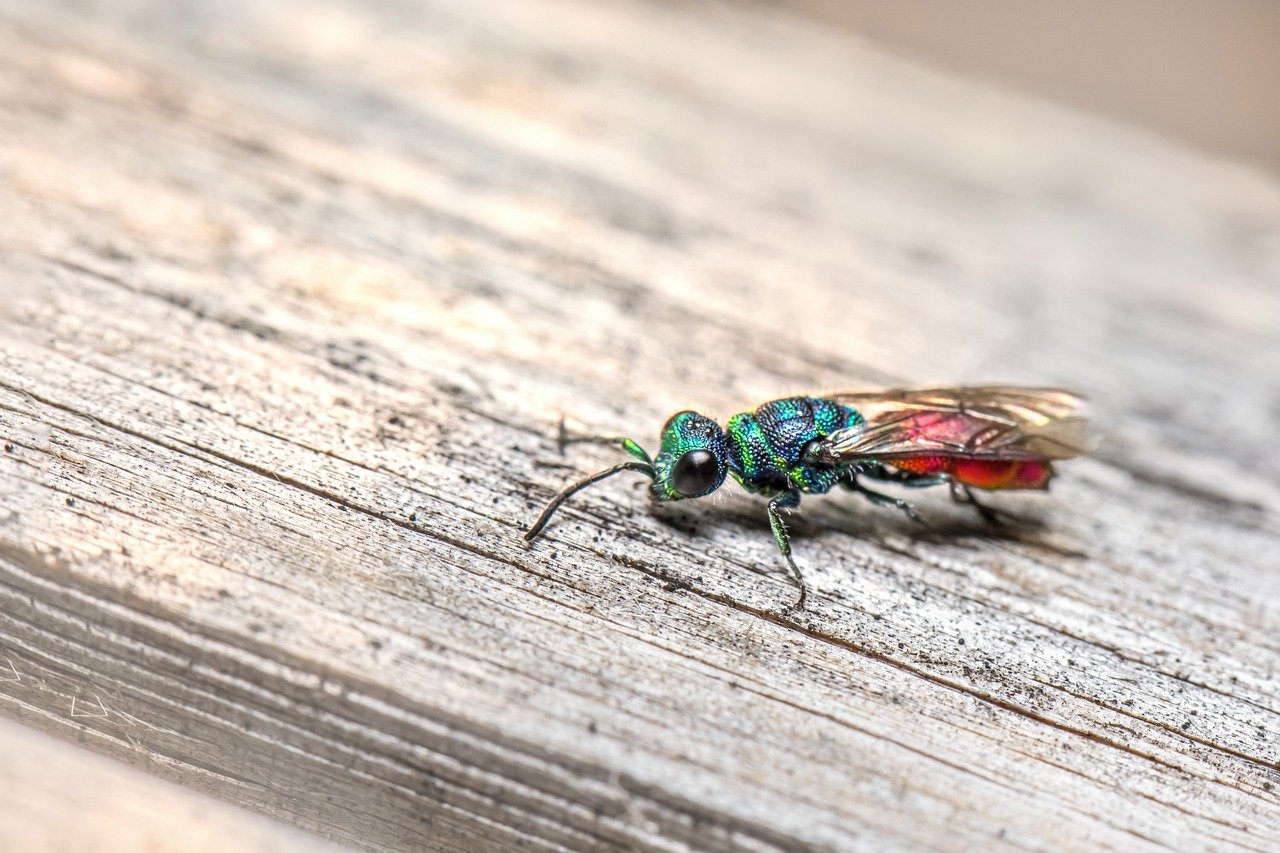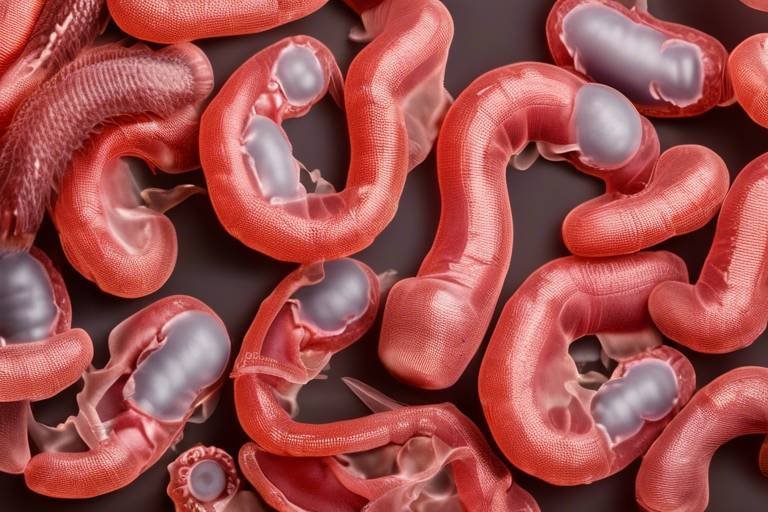Effective Parasite Prevention for Your Pets
As pet owners, we often consider our furry friends as part of the family, and just like any family member, their health and well-being should be a top priority. One of the most significant threats to our pets' health comes from parasites, those tiny invaders that can wreak havoc on their bodies and overall happiness. This article explores essential strategies for preventing parasites in pets, ensuring their health and well-being. Discover practical tips, treatments, and preventive measures to keep your furry friends safe from these harmful invaders.
To effectively prevent parasites, it’s crucial to understand the most prevalent ones that affect our pets. Fleas, ticks, and worms are some of the most common culprits. Fleas are notorious for causing itching and discomfort, while ticks can transmit serious diseases. Worms, such as roundworms and tapeworms, may not be visible but can lead to severe health issues. By understanding their life cycles and behaviors, pet owners can take proactive measures to protect their pets. For instance, knowing that fleas can reproduce rapidly means that even a few can turn into an infestation in no time, which is why early intervention is vital.
Recognizing the signs of parasite infestations is vital for timely intervention. Symptoms can vary depending on the type of parasite but may include excessive scratching, hair loss, lethargy, or gastrointestinal upset. If you notice your pet exhibiting any unusual behaviors, it’s essential to consult a veterinarian. Early detection can prevent more severe health issues down the line. For example, if your dog is suddenly more tired than usual, or your cat is grooming excessively, these could be signs of fleas or ticks. Don't wait for the problem to escalate; act quickly!
Fleas and ticks are common external parasites that can cause significant discomfort and health issues for pets. Fleas not only irritate the skin but can also lead to allergic reactions and anemia in severe cases. Ticks, on the other hand, can transmit diseases like Lyme disease and Rocky Mountain spotted fever, which can have serious consequences for both pets and humans. Understanding their impact and prevention methods is essential for pet owners. Regularly checking your pets for these unwanted guests, especially after outdoor activities, can make a big difference.
Various preventive treatments are available for fleas, including topical solutions, oral medications, and natural remedies. Topical treatments are easy to apply and can provide long-lasting protection. Oral medications, on the other hand, work systemically to kill fleas and prevent infestations. Natural remedies, such as essential oils and herbal treatments, can also be effective but should be used with caution. Always consult with your veterinarian to determine the best option for your pet's specific needs.
Tick control is crucial, especially in areas where they are prevalent. Some effective strategies to keep ticks at bay include:
- Regularly checking your pet for ticks after outdoor activities
- Using tick prevention treatments as recommended by your vet
- Avoiding high-risk areas, such as tall grass and dense woods
- Keeping your yard well-maintained to reduce tick habitats
By implementing these strategies, you can significantly reduce the risk of tick infestations and protect your pets during their outdoor adventures.
Internal parasites, such as roundworms and tapeworms, pose serious health risks to pets. These parasites can be contracted through contaminated food, water, or soil, and their effects can range from mild discomfort to severe illness. Symptoms of internal parasites may include vomiting, diarrhea, and weight loss. Regular deworming and preventive measures are essential to keep these hidden threats at bay. If you suspect your pet has worms, a visit to the vet for a fecal examination is crucial for proper diagnosis and treatment.
Regular veterinary visits are essential for maintaining your pet's health and preventing parasite infestations. During these check-ups, your veterinarian can perform screenings for parasites, recommend preventive treatments, and provide valuable insights into your pet's overall health. It's a good idea to schedule these visits at least once a year, or more frequently if your pet is at higher risk for parasites. Think of it as a health insurance policy for your furry friend—prevention is always better than cure!
Vaccination and preventive medications play a crucial role in parasite prevention. Vaccines can protect against diseases transmitted by parasites, while preventive medications can help keep parasites at bay. Discuss with your veterinarian about the recommended vaccines and medications for your pet's specific needs, as these can vary based on age, lifestyle, and risk factors. Keeping your pet up-to-date with vaccinations and preventive treatments is one of the best ways to ensure their safety and health.
Managing your home environment is key to preventing parasite infestations. Simple steps like regular cleaning, vacuuming, and washing your pet's bedding can help eliminate flea eggs and larvae. Additionally, landscaping your yard to reduce tall grasses and brush can minimize tick habitats. Creating a pet-friendly space not only benefits your pets but also contributes to a healthier home environment. Remember, a clean home is a happy home!
Exploring natural remedies can provide additional options for parasite prevention. Herbal treatments, such as diatomaceous earth and neem oil, have been known to deter fleas and ticks. Holistic approaches, including maintaining a healthy diet and using probiotics, can also support your pet's immune system, making them less susceptible to infestations. However, it's essential to consult with your veterinarian before starting any natural treatments to ensure they are safe and effective for your pet.
Q: How often should I check my pet for parasites?
A: It's a good practice to check your pet for fleas and ticks after every outdoor activity, especially in high-risk areas.
Q: Can I use human medications on my pets for parasite prevention?
A: No, human medications can be harmful to pets. Always consult your veterinarian for appropriate treatments.
Q: What are the signs that my pet has parasites?
A: Common signs include scratching, hair loss, lethargy, vomiting, and diarrhea. If you notice any of these symptoms, consult a veterinarian.
Q: Are natural remedies effective for parasite control?
A: Some natural remedies can be effective, but it's essential to consult with your veterinarian to ensure they are safe for your pet.

Understanding Common Pet Parasites
When it comes to our beloved furry companions, understanding the threats posed by common pet parasites is essential for their health and happiness. These tiny invaders can wreak havoc on your pet's well-being if left unchecked. The most prevalent parasites that pet owners should be aware of include fleas, ticks, and various types of worms. Each of these parasites has a unique life cycle and behavior that can significantly impact your pet's quality of life.
Let's dive deeper into these pesky parasites. Fleas, for instance, are notorious for their ability to multiply rapidly. A single female flea can lay up to 50 eggs a day, leading to a full-blown infestation in no time. Fleas not only cause intense itching and discomfort for your pet, but they can also transmit diseases and lead to more severe health issues, such as anemia, especially in young or elderly pets.
Ticks, on the other hand, are not just a nuisance; they can be carriers of serious diseases like Lyme disease and Rocky Mountain spotted fever. These arachnids attach themselves to your pet's skin and can remain there for several days, feeding on blood. Understanding their preferred habitats, such as tall grasses and wooded areas, can help you take preventive measures while enjoying outdoor activities with your pets.
Then we have internal parasites, which often go unnoticed until they cause significant health problems. Roundworms and tapeworms are two of the most common internal parasites that can affect pets. Roundworms are especially prevalent in puppies and kittens, as they can be transmitted through the mother’s milk or contaminated environments. Symptoms may include a bloated abdomen, vomiting, or noticeable worms in the stool. Tapeworms, on the other hand, are often identified by the presence of rice-like segments around the pet's rear end.
To effectively prevent these parasites, it's crucial to understand their life cycles. Fleas undergo four life stages: egg, larva, pupa, and adult. Understanding this cycle can help you target your treatment more effectively. Similarly, ticks have a life cycle that includes larva, nymph, and adult stages. By knowing when they are most active, you can better protect your pets.
In summary, being aware of the common parasites that affect pets is the first step in keeping them safe and healthy. By recognizing the signs of infestation and understanding the life cycles of these parasites, you can take proactive measures to protect your furry friends from their harmful effects. Remember, a well-informed pet owner is the best defense against these unwanted invaders!

Signs of Parasite Infestation
Recognizing the signs of parasite infestations in your pets is crucial for ensuring their health and well-being. Just like we often ignore that persistent itch or a sudden fatigue, our furry friends can also show subtle signs that something is amiss. Being proactive and observant can make all the difference. So, what should you look out for? Here are some common symptoms that may indicate your pet is dealing with unwelcome guests:
First and foremost, excessive scratching or biting at their skin is a major red flag. If your pet seems to be in a constant battle with their own body, it could be an indication of fleas or ticks. These tiny pests can cause significant discomfort, leading to irritation and even skin infections. Keep an eye out for hot spots or areas where your pet licks excessively; these can be signs of allergies or infestations.
Another sign to watch for is changes in appetite. Is your pet suddenly turning their nose up at their favorite food? Or are they eating voraciously, as if they can never get enough? Both scenarios can be linked to internal parasites like worms. These parasites can rob your pet of essential nutrients, leading to weight loss and lethargy. In contrast, some pets may overeat in an attempt to compensate for the nutrients they’re missing.
Additionally, keep an eye on your pet's stool. If you notice anything unusual, such as diarrhea or the presence of worms in their feces, it’s time to take action. A sudden change in bowel habits can indicate an internal parasite infestation, and it’s crucial to address this promptly. Regularly checking your pet’s stool can provide valuable insights into their health.
Moreover, vomiting can also be a symptom of parasites. While there are many reasons a pet may vomit, if it’s accompanied by other signs like weight loss or lethargy, it’s wise to consult your veterinarian. In some cases, pets may even vomit up worms, which is a clear indication that they need immediate treatment.
Lastly, don’t overlook behavioral changes. If your usually playful pup seems unusually lethargic or withdrawn, it could be a sign of a parasite issue. Pets that are feeling unwell may hide or avoid interaction. Just like us, pets can exhibit mood changes when they’re not feeling their best.
To summarize, here are the key signs of a potential parasite infestation:
- Excessive scratching or biting
- Changes in appetite
- Unusual stool (diarrhea, presence of worms)
- Vomiting
- Behavioral changes (lethargy, withdrawal)
By keeping a close eye on these signs, you can ensure your furry friend gets the care they need before parasites become a serious issue. Remember, early detection is key to effective treatment!
Q: How often should I check my pet for signs of parasites?
A: It’s a good practice to check your pet regularly, especially after outdoor activities. Look for signs of scratching, unusual behavior, or changes in appetite.
Q: What should I do if I suspect my pet has parasites?
A: Contact your veterinarian immediately. They can perform tests and recommend appropriate treatments to eliminate the parasites.
Q: Are there any preventive measures I can take?
A: Yes! Regular veterinary check-ups, preventive medications, and maintaining a clean environment can significantly reduce the risk of parasite infestations.
Q: Can parasites affect humans?
A: Some parasites can be transmitted from pets to humans, so it’s essential to keep both your pets and your living environment clean and healthy.
Fleas and Ticks: The Unwanted Guests
When it comes to our beloved pets, few things are as bothersome as fleas and ticks. These tiny creatures not only cause discomfort but can also lead to serious health issues if left unchecked. Imagine your furry friend, happily wagging their tail, suddenly scratching incessantly or shaking their head. That’s often a telltale sign of an infestation. Fleas and ticks are more than just a nuisance; they can transmit diseases and cause allergic reactions, making it imperative for pet owners to stay vigilant.
Fleas are small, wingless insects that thrive in warm, humid environments. They can jump up to 200 times their body length, making them adept at moving from one host to another. Ticks, on the other hand, are arachnids that latch onto your pet's skin to feed on their blood. They are often found in grassy or wooded areas, waiting for a host to pass by. Understanding their life cycles is crucial for effective prevention. Fleas can reproduce quickly, laying hundreds of eggs that can infest your home, while ticks can carry diseases like Lyme disease and Rocky Mountain spotted fever.
To keep your pets safe from these unwanted guests, regular grooming is essential. Brushing your pet's fur can help remove fleas and ticks before they become a bigger problem. Additionally, consider using flea and tick prevention products that suit your pet's lifestyle. There are various options available, including:
- Topical treatments: These are applied directly to your pet's skin and can provide long-lasting protection.
- Oral medications: These pills work systemically to repel or kill fleas and ticks.
- Collars: Flea and tick collars can provide continuous protection and are easy to use.
- Natural remedies: Some pet owners prefer herbal treatments, which can be effective, though they may require more frequent application.
It's not just enough to treat your pets; you must also focus on your home environment. Fleas can live in carpets, bedding, and even your pet's favorite lounging spots. Regular vacuuming and washing of pet bedding can help eliminate any lingering pests. For tick prevention, keep your yard tidy by mowing the lawn regularly and removing any debris where ticks may hide.
In conclusion, fleas and ticks are indeed the unwanted guests in your pet's life. By understanding their behavior and implementing preventive measures, you can ensure your furry companions remain comfortable and healthy. Remember, a proactive approach is always better than a reactive one when it comes to pest control.
Preventive Treatments for Fleas
Fleas are more than just a nuisance; they can lead to serious health problems for your beloved pets. As a pet owner, it's crucial to stay one step ahead of these pesky parasites. Thankfully, there are numerous preventive treatments available that can help keep fleas at bay. From topical solutions to oral medications, the choices can be overwhelming, but understanding your options is key to effective prevention.
One of the most popular methods for flea control is topical treatments. These are applied directly to your pet's skin, usually between the shoulder blades. They work by spreading across the skin's surface, providing protection for several weeks. Some well-known brands include Frontline and Advantage, which not only kill adult fleas but also prevent future infestations by targeting flea eggs and larvae. It's important to follow the instructions carefully to ensure maximum effectiveness.
In addition to topical solutions, oral medications have gained popularity in recent years. These pills, such as Comfortis or Capstar, are ingested and work quickly to eliminate fleas from your pet's system. Many pet owners appreciate the convenience of oral treatments, especially for pets that resist topical applications. However, it's vital to consult with your veterinarian to determine the best option based on your pet's health and lifestyle.
For those who prefer a more natural approach, there are several natural remedies that can be effective in repelling fleas. Essential oils like lavender, peppermint, and eucalyptus can be diluted and applied to your pet's collar or bedding. Additionally, diatomaceous earth, a natural powder, can be sprinkled in areas where fleas are likely to hide. It works by dehydrating the fleas and their eggs, making it a safe option for homes with children and other pets.
Regardless of the treatment you choose, it's essential to maintain a comprehensive flea prevention strategy. This includes not only treating your pets but also addressing your home environment. Regular vacuuming, washing pet bedding, and using flea sprays in your living space can significantly reduce the chances of a flea infestation.
To summarize, here are the key preventive treatments for fleas:
- Topical treatments: Applied to the skin and offer long-lasting protection.
- Oral medications: Quick-acting pills that eliminate fleas from within.
- Natural remedies: Essential oils and diatomaceous earth for a holistic approach.
In conclusion, keeping your pets flea-free is an ongoing commitment that requires vigilance and regular treatment. By understanding the various options available and implementing a multi-faceted approach, you can ensure that your furry friends remain happy, healthy, and free from the discomfort of fleas.
Q: How often should I treat my pet for fleas?
A: It's generally recommended to treat your pet monthly, but consult your veterinarian for a schedule tailored to your pet's needs.
Q: Are natural remedies effective for flea prevention?
A: While some natural remedies can help repel fleas, they may not be as effective as conventional treatments. It's best to use them in conjunction with other preventive measures.
Q: Can fleas affect humans?
A: Yes, fleas can bite humans and cause itching and irritation. They can also transmit diseases, making it important to keep your home and pets flea-free.
Tick Control Strategies
Ticks are more than just a nuisance; they can transmit serious diseases to your pets and even to humans. Therefore, implementing effective tick control strategies is essential to ensuring the health and safety of your furry companions. One of the first steps in tick prevention is understanding the environments where ticks thrive. Ticks love humid and wooded areas, so if you live near forests or tall grasses, you need to be extra vigilant. Regularly checking your pets for ticks after outdoor activities is crucial, as early detection can prevent complications.
Another effective strategy is to keep your yard well-maintained. Mowing the lawn regularly, clearing away tall grasses, and removing debris can significantly reduce tick habitats. You might also want to create a barrier between your yard and wooded areas by using gravel or wood chips, which can deter ticks from entering your space. If your pets spend a lot of time outdoors, consider using tick repellents specifically formulated for animals. These can come in various forms, including sprays, collars, and spot-on treatments. It's essential to consult your veterinarian to determine which product is best for your pet, as some may be more effective than others depending on your region.
Moreover, integrating natural predators into your yard can be an innovative way to control the tick population. For instance, birds and certain insects feed on ticks, so creating a bird-friendly environment can help keep those pesky critters at bay. You can also consider using nematodes, which are microscopic worms that naturally target and kill ticks. These biological controls can be a safe and environmentally friendly option.
In addition to outdoor management, regular grooming of your pet is vital. Brushing your pet can help you spot ticks early, and bathing them with tick-repellent shampoos can add an extra layer of protection. If you find a tick on your pet, it’s crucial to remove it promptly and correctly. Use fine-tipped tweezers to grasp the tick as close to the skin’s surface as possible and pull upward with steady, even pressure. After removal, clean the bite area and your hands with rubbing alcohol, an iodine scrub, or soap and water.
Finally, don't underestimate the importance of routine veterinary care. Your vet can provide valuable insights into tick prevention and may recommend specific vaccinations for diseases transmitted by ticks, such as Lyme disease. Staying informed and proactive about tick control will ensure that your pets remain healthy and happy.
- How often should I check my pet for ticks? It's advisable to check your pet for ticks after every outdoor excursion, especially in wooded or grassy areas.
- What are the signs of a tick-borne illness in pets? Symptoms can include lethargy, loss of appetite, fever, and joint pain. If you notice any of these signs, consult your veterinarian immediately.
- Are natural tick repellents effective? Some natural repellents can be effective, but it's essential to discuss these options with your veterinarian to ensure they are safe for your pet.
Internal Parasites: Worms and More
When it comes to our beloved pets, the term "internal parasites" often sends a shiver down our spines. These unseen invaders, such as roundworms, tapeworms, and hookworms, can wreak havoc on your pet's health without you even realizing it. Imagine your furry friend feeling sluggish and unwell, all because of tiny creatures that are silently sapping their nutrients and vitality. Understanding these parasites is crucial for every pet owner. Not only do they pose serious health risks, but they can also affect the overall well-being of your pet.
Internal parasites typically enter your pet's body through contaminated food, water, or soil. For instance, a simple stroll in the park can expose your dog to eggs or larvae hiding in the grass. Once ingested, these parasites can mature and multiply, leading to a range of health issues. Symptoms of an infestation can vary, but some common signs to watch for include:
- Weight loss despite a normal or increased appetite.
- Vomiting, which may contain worms.
- Diarrhea, sometimes with blood.
- Abdominal bloating or discomfort.
- Distended abdomen in puppies, often referred to as "pot-bellied."
It’s essential to note that some pets may show no symptoms at all, making regular veterinary check-ups even more critical. During these visits, your vet can perform fecal tests to detect the presence of these parasites and recommend appropriate treatments. Treatment typically involves deworming medications, which are effective in eliminating these pesky invaders.
Prevention is, of course, the best strategy. Keeping your pet on a regular deworming schedule and ensuring they receive vaccinations can significantly reduce the risk of infection. Additionally, practicing good hygiene—like cleaning up your pet’s waste immediately and keeping their living area clean—can help minimize exposure to these parasites.
As a pet owner, you hold the key to your pet's health. By staying informed and proactive about internal parasites, you can ensure your furry companions lead happy, healthy lives. Remember, a little vigilance goes a long way in keeping those unwanted guests at bay!
Q: How often should I deworm my pet?
A: It's generally recommended to deworm puppies and kittens every two weeks until they are three months old, and then every three months thereafter. Adult pets should be dewormed at least once or twice a year, but consult your veterinarian for a plan tailored to your pet's needs.
Q: Can humans get internal parasites from pets?
A: Yes, some internal parasites can be transmitted from pets to humans, especially children. It's essential to practice good hygiene, such as washing hands after handling pets and cleaning up their waste promptly.
Q: What are the signs that my pet may have worms?
A: Common signs include weight loss, a bloated abdomen, vomiting, diarrhea, and visible worms in the stool or vomit. If you notice any of these symptoms, contact your veterinarian immediately.
Q: Are there natural remedies for preventing internal parasites?
A: While some natural remedies may help, they are not a substitute for veterinary care. Maintaining a clean environment, feeding a balanced diet, and using natural dewormers like pumpkin seeds may provide additional support, but always consult your vet before trying new treatments.

Routine Veterinary Check-ups
When it comes to keeping your pets healthy and happy, are absolutely essential. Think of it as a preventive shield against potential health issues. Just like we visit our doctors for regular health screenings, our furry friends deserve the same level of care. These check-ups allow veterinarians to catch any early signs of parasites or other health problems before they escalate into serious conditions. After all, an ounce of prevention is worth a pound of cure, right?
During a typical check-up, your vet will conduct a thorough examination of your pet, checking their weight, coat condition, and overall demeanor. They may also perform specific tests to detect parasites, such as fecal examinations for worms or skin scrapes for external parasites. This is crucial because many parasites can be lurking without showing any obvious symptoms. By being proactive, you can ensure that your pet is not only free from parasites but also in optimal health.
Furthermore, these visits provide an excellent opportunity for pet owners to ask questions about their pets’ health, diet, and lifestyle. Have you noticed your pet scratching more than usual? Or perhaps they seem a bit lethargic? Discussing these observations with your vet can lead to valuable insights and recommendations tailored specifically to your pet's needs. Remember, your veterinarian is not just a medical professional; they are a partner in your pet's health journey.
In addition to physical examinations, routine check-ups often include important vaccinations and preventive medications. Vaccinations are vital for protecting your pet from various diseases, some of which can be transmitted by parasites. For instance, keeping your pet up-to-date on vaccines can help prevent diseases like Lyme disease, which is carried by ticks. Preventive medications, such as flea and tick treatments, are also discussed during these visits to ensure your pet remains protected year-round.
To give you a clearer picture of what to expect during a routine veterinary check-up, here’s a simple table summarizing the typical components:
| Check-up Component | Description |
|---|---|
| Physical Examination | A thorough check of your pet's overall health, including weight and coat condition. |
| Parasite Screening | Tests to detect any internal or external parasites. |
| Vaccinations | Administration of necessary vaccines to prevent diseases. |
| Preventive Medications | Recommendations for flea, tick, and worm preventatives. |
| Owner Consultations | Time for pet owners to ask questions and discuss concerns. |
In summary, routine veterinary check-ups are a critical aspect of your pet's health care regimen. They not only help detect and prevent parasite infestations but also foster a strong relationship between you, your pet, and your veterinarian. So, don’t wait for symptoms to appear—schedule that check-up today and give your furry companion the best chance at a healthy life!
- How often should I take my pet to the vet? It’s generally recommended to take your pet for check-ups at least once a year, but puppies and kittens may need more frequent visits.
- What should I do if I suspect my pet has parasites? If you notice signs of parasites, such as scratching or weight loss, contact your veterinarian immediately.
- Are routine check-ups expensive? While there is a cost associated, routine check-ups can save you money in the long run by preventing serious health issues.
Vaccination and Preventive Medications
When it comes to keeping our beloved pets safe from pesky parasites, vaccination and preventive medications are the dynamic duo every pet owner should know about. Just like how we humans get vaccinated to ward off diseases, our furry friends need the same kind of protection to ensure they live a happy, healthy life. But what exactly do these vaccinations and medications do? Well, they’re like a shield, fortifying your pet's immune system against a variety of parasites that could otherwise wreak havoc on their health.
For instance, vaccines can help prevent diseases caused by parasites, such as Lyme disease—transmitted by ticks—or heartworm disease, which is spread by mosquitoes. These conditions can lead to severe health issues, and in some cases, they can even be fatal. That’s why it’s crucial to stay on top of your pet's vaccination schedule and consult your veterinarian to understand which vaccines are best suited for your pet’s lifestyle and environment.
Preventive medications come into play as a second line of defense. These are typically administered monthly and can include treatments for fleas, ticks, and internal parasites like worms. Think of them as a monthly subscription to your pet’s health, ensuring they’re consistently protected. Some popular preventive medications include:
- Flea and Tick Preventatives: These can be topical treatments, collars, or oral medications that help keep fleas and ticks at bay.
- Heartworm Preventatives: These are crucial, especially in warmer climates where mosquitoes thrive. They usually come in chewable forms that pets find tasty!
- Worming Treatments: Regular deworming can help eliminate any internal parasites your pet may have picked up from the environment.
It's essential to follow your veterinarian's recommendations regarding the timing and frequency of these vaccinations and medications. Some vaccines require boosters, while others may be given annually or biannually. Keeping a detailed record of your pet’s vaccination history can be incredibly helpful, not only for your vet visits but also for any travel plans you might have with your pet.
In summary, vaccinations and preventive medications are vital components of a comprehensive strategy for parasite prevention. They work hand in hand to protect your pets from harmful invaders, ensuring they stay healthy and happy. So, don’t hesitate to reach out to your vet and discuss the best options for your furry friend. After all, an ounce of prevention is worth a pound of cure!
Q: How often should my pet be vaccinated?
A: Vaccination schedules can vary based on your pet's age, health, and lifestyle. Generally, puppies and kittens require a series of vaccinations in their first year, while adult pets may need boosters annually or every three years.
Q: Are preventive medications safe for my pet?
A: Yes, when administered under a veterinarian's guidance, preventive medications are generally safe. However, it's crucial to discuss any pre-existing conditions your pet may have with your vet.
Q: Can I use natural remedies instead of vaccinations?
A: While some natural remedies may help, they are not a substitute for vaccinations or preventive medications. It’s best to consult with your veterinarian for a balanced approach to your pet’s health.
Home Environment Management
Managing your home environment is crucial for keeping parasites at bay and ensuring your pets remain healthy and happy. Just like we wouldn’t want unwanted guests in our homes, our furry friends deserve the same comfort. By creating a clean and safe space, you can significantly reduce the chances of a parasite infestation. Start by regularly cleaning areas where your pets spend the most time. Vacuuming carpets, upholstery, and even your pet's bedding can help remove any eggs or larvae that might be lurking around. Remember, a clean home is not just visually appealing; it’s a fortress against parasites!
In addition to regular cleaning, consider the outdoor areas where your pets roam. Keeping your yard tidy is essential. Trim back overgrown bushes and grass, as these can be perfect hiding spots for ticks and fleas. You might also want to create a designated play area for your pets, which can be easier to manage and monitor for any signs of pests. Just think of it as building a safe haven for your pets, where they can frolic without the fear of encountering parasites.
Another effective strategy is to use preventive treatments in your home environment. For instance, you can use flea and tick sprays in areas where your pets frequently hang out. These treatments act as a barrier, making it less likely for pests to invade your home. However, always ensure that any products you use are safe for pets. After all, the last thing you want is to replace one problem with another!
Consider the following tips for effective home environment management:
- Regular Cleaning: Vacuum and wash your pet’s bedding weekly.
- Yard Maintenance: Keep grass trimmed and remove debris.
- Safe Treatments: Use pet-friendly pest control products.
- Monitor Indoor Plants: Some plants can attract pests; keep an eye on them!
Finally, educate yourself about the signs of parasite infestations. By being vigilant and proactive in your home management, you can catch potential issues before they escalate. Think of it as being the superhero of your pet’s health—always on the lookout for threats and ready to swoop in to save the day!
Q: How often should I clean my pet's living area?
A: It's best to clean your pet's living area at least once a week to minimize the risk of parasites.
Q: Are there natural methods to repel fleas and ticks in the home?
A: Yes, using essential oils like lavender or cedar can help repel fleas and ticks. Just ensure they are safe for pets!
Q: How can I tell if my pet has a parasite infestation?
A: Look for signs such as excessive scratching, weight loss, or changes in appetite. If you notice any of these symptoms, consult your veterinarian.
Q: Should I use chemical treatments for pest control?
A: While chemical treatments can be effective, always opt for pet-safe options and consult with your vet before use.

Natural Remedies for Parasite Prevention
When it comes to keeping our beloved pets safe from parasites, many pet owners are turning to natural remedies as a way to avoid harsh chemicals and side effects. After all, who wouldn’t want to protect their furry friends with gentle, yet effective solutions? Natural remedies not only help in preventing infestations but also promote overall health and well-being. Let’s dive into some of the most popular and effective natural methods that can keep those pesky parasites at bay.
One of the most commonly used natural remedies is diatomaceous earth. This fine powder is made from the fossilized remains of tiny, aquatic organisms called diatoms. When sprinkled in areas where your pet frequents, it can effectively dehydrate and kill fleas and ticks upon contact. Just be cautious to use food-grade diatomaceous earth, as this ensures it is safe for your pets. You can also apply it to your pet's coat, but be sure to avoid their eyes and nose.
Another great option is essential oils. Oils such as lavender, cedarwood, and peppermint have natural insect-repelling properties. You can create a simple spray by diluting a few drops of essential oil in water and lightly misting your pet’s coat. Just remember to always consult with your veterinarian before using essential oils, as some can be harmful to pets, especially cats.
Garlic is often touted as a natural remedy for preventing fleas and ticks. While it's true that garlic can be beneficial in small amounts, it’s important to note that excessive consumption can be toxic to pets. Therefore, if you choose to include garlic in your pet's diet, do so sparingly and always consult your vet for the appropriate dosage.
Additionally, maintaining a clean environment is crucial. Regularly vacuuming your home and washing your pet's bedding can significantly reduce the chances of a parasite infestation. You might also consider using natural repellents in your yard, such as planting marigolds or using neem oil, both of which are known to deter fleas and ticks.
Lastly, a healthy diet can strengthen your pet’s immune system, making them less susceptible to parasites. Foods rich in omega-3 fatty acids, such as fish oil, can enhance skin health and help repel pests. Always consult with your veterinarian before making significant changes to your pet's diet.
In summary, while natural remedies can be effective in preventing parasites, they should be used as part of a comprehensive approach that includes regular veterinary care and good hygiene practices. By combining these methods, you can create a safe and healthy environment for your pets, keeping them happy and parasite-free.
- Are natural remedies effective against all types of parasites?
Natural remedies can be effective against many external parasites like fleas and ticks, but they may not be as effective against internal parasites such as worms. It's important to consult with your vet for a comprehensive prevention plan. - Can I use essential oils on my pets?
Yes, but caution is necessary. Always dilute essential oils and check with your veterinarian, as some oils can be toxic to pets. - How often should I apply natural remedies?
It depends on the remedy used. For example, diatomaceous earth can be reapplied every few weeks, while essential oils may need to be applied more frequently depending on the environment. - Is it safe to combine natural remedies with conventional treatments?
While many natural remedies can complement conventional treatments, it’s best to discuss this with your vet to avoid any adverse interactions.
Frequently Asked Questions
- What are the most common parasites that affect pets?
The most common parasites that affect pets include fleas, ticks, and various types of worms such as roundworms and tapeworms. Understanding these parasites, their life cycles, and behaviors is crucial for effective prevention and treatment.
- How can I tell if my pet has a parasite infestation?
Signs of parasite infestation can vary, but common symptoms include excessive scratching, biting at the skin, weight loss, bloating, and visible worms in feces. If you notice any of these signs, it's important to consult your veterinarian for a proper diagnosis.
- What preventive treatments are available for fleas?
There are several effective preventive treatments for fleas, including topical solutions, oral medications, and even natural remedies. It's essential to choose a method that works best for your pet's lifestyle and health needs.
- How can I keep ticks away from my pets?
To keep ticks at bay, consider using tick prevention medications, avoiding tall grasses during walks, and regularly checking your pet for ticks after outdoor activities. Maintaining a clean yard can also help reduce tick populations.
- What are the risks associated with internal parasites?
Internal parasites like roundworms and tapeworms can lead to serious health issues in pets, including malnutrition, anemia, and gastrointestinal problems. Regular veterinary check-ups can help catch these issues early.
- Why are routine veterinary check-ups important?
Routine veterinary check-ups are crucial for maintaining your pet's health and preventing parasite infestations. They allow for early detection of potential issues and ensure your pet is up-to-date on vaccinations and preventive medications.
- What vaccinations are recommended for parasite prevention?
Vaccinations can vary based on your pet's age, health, and lifestyle, but common vaccines include those for parvovirus, distemper, and rabies. Your veterinarian can provide a tailored vaccination schedule for your pet.
- How can I manage my home environment to prevent parasites?
To manage your home environment, keep it clean by regularly vacuuming and washing pet bedding. Additionally, maintaining your yard with proper landscaping can help minimize areas where parasites thrive.
- Are there natural remedies for preventing parasites in pets?
Yes, there are several natural remedies for parasite prevention, such as herbal treatments and holistic approaches. However, it's best to consult with your veterinarian before trying any new treatments to ensure they are safe for your pet.



















